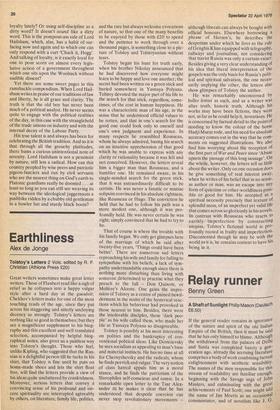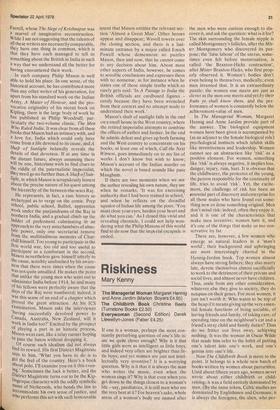Relay runner
Benny Green
A Shaft of Sunlight Philip Mason (Deutsch £6.50)
If the general reader remains in ignorance of the nature and spirit of the old Indian Empire of the British, then it must be said that he has only himself to blame. Although. the withdrawal from the palaces of Delhi and Simla was completed barely a generation ago, already the accruing literature comprises a body of work combining factual enlightenment with aesthetic sensibility. The names of the men responsible for this stream of readability are familiar enough, beginning with the Savage saga of John Masters, and culminating with the great achievements of Paul Scott; one might add the name of Jan Morris as an occasional commentator, and of novelists like J. G. Farrell, whose The Siege of Krishnapur was a marvel of imaginative reconstruction.
While I am not suggesting that the talents of all these writers are necessarily comparable,
they have one thing in common, which is that they have each managed to tell us something about the British in India in such a way that we understand all the better for having encountered their work.
In such company Philip Mason is well able to hold his place. In one sense, of the historical account, he has contributed more than any other writer of his generation, for apart from his standard work on the Indian
Army, A Matter of Honour, and the pro
vocative originality of his recent book on Kipling, there is the large body of work he has published as Philip Woodruff, par
ticularly the two-volume classic, The Men Who Ruled India. It was clear from all these
books that Mason had an intimacy with, and
a love for, India which could only have come from a life devoted to its cause, and A Shaft of Sunlight belatedly reveals the
details of that devotion. If at any time in the distant future, always assuming there Will be one, historians wish to find clues to
the riddle of the paternalistic imperialist, they need go no further than A Shaft of Sun light, in which Mason is scrupulously honest
about the precise nature of his quest among the hierarchy of the between-the-wars Raj. He represents, in fact, a case history so archetypal as to verge on the comic. Prep school, public school, Balliol, apprentice work under the panjandrums of the Raj in northern India, and a gradual climb up the ladder of preferment culminating in an approach to the very antechambers of absolute power, only one secretarial remove from the multitudinous memoirs of Churchill himself. Too young to participate in the first world war, too old and too useful to Participate as a combatant in the second, Mason nevertheless gave himself utterly to the cause, sensibly unabashed by his aware ness that there were times when the cause was not quite unsullied. He makes the point that unlike the young men who went out to administer India before 1914, he and many
of his fellows were perfectly aware that the days of the Raj were numbered; indeed, it
Was this sense of an end of a chapter which proved the great attraction. At his ICS examination, Mason asks the interviewer having successfully devolved power to Canada, Australia, New Zealand, will it Work in India too?' Excited by the prospect of playing a part in an historic process, Mason went east, like a relay runner hoping to pass the baton without dropping it. Of course such idealism did not always find its reward. His first District Magistrate says to him, 'What you have to do is to get the feel of the country. Here's a book 'bout polo. I'll examine you on it this even ing.' Sometimes the luck is better, and the
r?Istrict Magistrate turns out to be the Kiplingesque character with the oddly symbolic name of Nethersole, who bends the law to accommodate his own sense of justice, and Who performs this act with such honourable
intent that Mason entitles the relevant sec tion 'Almost a Great Man'. Other heroes appear and disappear; Wavell towers over the closing section, and there is a last minute entrance by a major called Enoch Powell whose demeanour so puzzles Mason, then and now, that he cannot come to any decision about him. About most other aspects of India, however, he comes to sensible conclusions and expresses them with no nonsense, as for instance when he states one of those simple truths which so
rarely gets said: 'In A Passage to India the British officials are cardboard figures — surely because they have been wrenched from their context and no attempt made to understand their work.'
Mason's shaft of sunlight falls in the end•
on a small house in the West country, where the retired imperialist attempts to combine the offices of author and farmer. In the end he admits defeat and gives up both farming and the West country to concentrate on his
books, at least one of which, Call the Next Witness, goes immediately on to my list of works I don't know but wish to know;
Mason's account of the Indian murder on which the novel is based sounds like pure M augham.
If there are two moments when we see the author revealing his own nature, they are when he remarks, 'It was for exercising authority that I had been trained in school,' and when he reflects on the dreadful squalor of Indian life among the poor, 'You must close your eyes, harden your heart and do what you can.' As I closed this vivid and revealing chronicle, I could not help wondering what the Philip Masons of this world find to do now that the imperial escapade is ended.



































 Previous page
Previous page